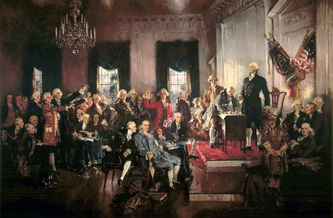George Washington addresses the Convention (bold added):
When the President rose, for the purpose of putting the question, he said that although his situation had hitherto restrained him from offering his sentiments on questions depending in the House, and it might be thought, ought now to impose silence on him, yet he could not forbear expressing his wish that the alteration proposed might take place. It was much to be desired that the objections to the plan recommended might be made as few as possible – The smallness of the proportion of Representatives had been considered by many members of the Convention, an insufficient security for the rights & interests of the people. He acknowledged that it had always appeared to himself among the exceptionable parts of the plan; and late as the present moment was for admitting amendments, he thought this of so much consequence that it would give much satisfaction to see it adopted.
Yes ... "among the exceptionable parts of the plan."
Happy Constitution Day! ~ And thanks George!


 RSS Feed
RSS Feed
